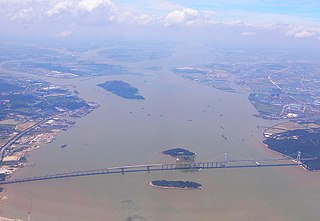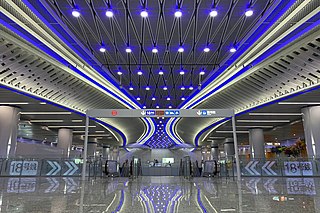
Zhongshan is a prefecture-level city in the south of the Pearl River Delta in Guangdong province, China. As of the 2020 census, the whole city with 4,418,060 inhabitants is now part of the Guangzhou–Shenzhen conurbation with 65,565,622 inhabitants. The city-core subdistricts used to be called Shiqi or Shekki.

The Pearl River Delta Metropolitan Region is the low-lying area surrounding the Pearl River estuary, where the Pearl River flows into the South China Sea. Referred to as the Guangdong–Hong Kong–Macao Greater Bay Area in official documents, the region is one of the most densely populated and urbanized regions in the world, and is considered a megacity by numerous scholars. It is currently the wealthiest region in Southern China and one of the wealthiest regions in China along with the Yangtze River Delta in Eastern China and Jingjinji in Northern China. Most of the region is part of the Pearl River Delta Economic Zone, which is a special economic zone of China.

Xiangshan County, also spelled Hsiangshan, Siangshan, Heungsan, and Heungshan, was a former county in Southern China. From 1912, it was a county in Guangdong Province, in the Republic of China. It was renamed Zhongshan in April 1925, in honor of the founder of the Republic of China, Sun Yat Sen, a Xiangshan native.

Xiaolan is a town situated at the northwest periphery of the city of Zhongshan, Guangdong Province, China.

The Humen, also known as the Bocca Tigris or the Bogue, is a narrow strait in the Pearl River Delta that separates Shiziyang in the north and Lingdingyang in the south. It is located near Humen Town in China's Guangdong Province. It is the site of the Pearl River's discharge into the South China Sea. It contains the Port of Humen at Humen Town. The strait is formed by the islands of Chuenpi and Anunghoy on the eastern side, and Taikoktow on the western side. Since 1997, the strait has been traversed by the Humen Pearl River Bridge. Bocca Tigris was the entry to China's only trading city, Canton.

Zhongshanba Station, formerly Zhongshan Balu Station during planning, is a station on Line 5 of the Guangzhou Metro. It is located under the junction of Zhongshan 8th Road (中山八路) and Huangsha Avenue (黄沙大道) in the commercial area of the Liwan District, near Liwan Lake (荔湾湖) and Guangzhou-Foshan Coach Terminal (广佛客运站). It opened on 28 December 2009.

Guangzhou–Zhuhai intercity railway or Guangzhu intercity railway is a dedicated, grade-separated regional railway linking Guangzhou South railway station in Panyu, Guangzhou, Jiangmen railway station in Xinhui, Jiangmen, and Zhuhai Jinwan Airport in Zhuhai, via Shunde, Zhongshan and Jiangmen, in Guangdong province. It is the first line completed in the Pearl River Delta Metropolitan Region intercity railway network. It is operated by China Railway Guangzhou Group.

The Bohai Sea is a gulf/inland sea approximately 77,000 km2 (30,000 sq mi) in area on the east coast of Mainland China. It is the northwestern and innermost extension of the Yellow Sea, to which it connects via the Bohai Strait. It has a mean depth of approximately 18 meters (59 ft), with a maximum depth of about 80 meters (260 ft) located in the northern part of the Bohai Strait.

Shiqi Subdistrict, also known as Shiqiqu Subdistrict, is a subdistrict located in the center of Zhongshan city, covering an area of 22.72 square kilometres (8.77 sq mi), and a population of about 227,200. The subdistrict administers 19 residential communities, and is home to major industrial and commercial activity.

Xiaolan railway station is an elevated station of Guangzhou–Zhuhai intercity railway.

The Shenzhen–Zhanjiang railway is a high-speed railway across the south of Guangdong province. Currently it runs from Jiangmen to Zhanjiang West. It will link the cities of Shenzhen and Zhanjiang when complete.
The Port of Jiaxing is a natural estuary deep-water international seaport on the Hangzhou Bay coast of Jiaxing, Zhejiang, China.
The Port of Wenzhou is a natural estuary deep-water international seaport on the coast of Wenzhou, Zhejiang, People's Republic of China. It opens into the East China Sea. In 2013, its total cargo throughput was 25.16 million tonnes, up 15.4% from 2012, and container throughput was 570,200 TEU, up 10.19%.
The Port of Fuzhou is a natural seaport centered on the estuary of the Minjiang River artificial deep-water international seaport on the coast of Fuzhou, Fujian, People's Republic of China. and of the neighboring prefecture of Ningde. The Port is located on the southeastern coast of Fujian, facing the Taiwan Strait. Fuzhou is the Mainland port closest to Taiwan, being just 149 Nautical miles from Keelung.
The Port of Huizhou is a natural coastal port located on Huizhou, Guangdong, People's Republic of China, immediately east of Shenzhen and Hong Kong. It opens into the Daya Bay. Started only 20 years ago, it has moved from a fishing village to another large player in the Pearl River Delta shipping hub. In 2012, its total cargo throughput was 51,18 million tonnes.
The Port of Zhenjiang is a natural inland river port located on Zhengjiang Prefectural Level city, Jiangsu, People's Republic of China. It is one of the succession of large shipping hubs lining the estuary and lower course of the Yangtze. The Port had a throughput of 140,984,000 tonnes of total cargo in 2013, an increase of 4.7%

The Chrysanthemum Festival, is a festival held in the town of Xiaolan in November. Zhongshan is sometimes called "Chrysanthemum city" because of its chrysanthemum culture. During the Ming dynasty, people planted chrysanthemums and gathered together to appreciate them. While doing that, they also wrote poems, drew pictures and drank liquor. Later, these gatherings grew into chrysanthemum festivals, which were held every 10 years. In Qing dynasty, people started holding the Grand Chrysanthemum Festival, which is held every 60 years. Now, chrysanthemum festivals are held every year, and draw visitors from around the world.

Line 18 of the Guangzhou Metro is a rapid transit express line in Guangzhou with trains operating up to 160 km/h (99 mph). It runs in a south-north direction, connecting Wanqingsha in Nansha District, Panyu Square in Panyu District, Modiesha in Haizhu District, Zhujiang New Town and Guangzhou East Railway Station in Tianhe District. The line commenced service on 28 September 2021.

The G2518 Shenzhen–Cenxi Expressway, commonly referred to as the Shencen Expressway, is an expressway in China that connects between the cities Shenzhen, Guangdong to Cenxi, Guangxi.
Song Creek (Chinese: 松溪)is a creek located in northern Taiwan, belonging to the Danshui River system and serving as a tributary of the Huang Creek. The river has a length of 2.93 kilometers and a watershed area of 4.5 square kilometers, situated at the border of Shilin District and Beitou District in Taipei City. Its source is on the southern side of Qixing Mountain, at an elevation of approximately 1,100 meters, near the Zhongshan Building in Yangmingshan. It flows southwest through the area between Shamao Mountain and Huakang, continuing through Banling and eventually joining the Huang Creek near Houdong.














